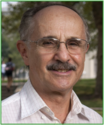Seminar: A Modeling Framework to Assess Costs and Uncertainties of Carbon Capture Technology Options

Dr. Edward S. Rubin is the Alumni Chair Professor of Environmental Engineering and Science at Carnegie Mellon University.
Abstract: Global climate change concerns have sparked widespread interest in CO2 capture and storage (CCS) as a method of reducing greenhouse gas emissions from electric power plants and other large industrial facilities. In turn, the high cost of current CCS technology has spawned major R&D programs in the U.S. and elsewhere to develop more cost-effective methods of CO2 capture, the most costly component of the CCS chain. This presentation will review the current status of performance and cost estimates for CCS, and discuss the key factors that influence CCS costs. Because of the large number of variables involved, analysis tools are needed that can help researchers, program managers, policy analysts, and technology developers to systematically evaluate alternative processes options—as well as the risks and potential payoffs of R&D in new technology. One such tool developed by Carnegie Mellon University for the U.S. Department of Energy is the IECM (for Integrated Environmental Control Model) —a publicly available computer model used worldwide to evaluate alternative CCS options for fossil fuel power plants (including PC, IGCC and NGCC designs). Examples of how this modeling framework can be used to evaluate and compare current and emerging technology options for a variety of situations will be discussed and illustrated, along with plans for its future development.
Bio: Dr. Edward S. Rubin is the Alumni Chair Professor of Environmental Engineering and Science at Carnegie Mellon University. He holds joint appointments in the Departments of Engineering & Public Policy, and Mechanical Engineering, and was the founding director of the university’s Center for Energy and Environmental Studies, and the Environmental Institute. He served as a coordinating lead author for the Intergovernmental Panel on Climate Change (IPCC) Special Report on Carbon Dioxide Capture and Storage, and more recently on the U.S. National Academies study of “America’s Climate Choices.” He also served on “blue ribbon” advisory committees to the State of California and the Province of Alberta (Canada) on policies for carbon capture and storage. He is the author of over 300 technical publications and recipient of the Lyman A. Ripperton Award for distinguished achievements as an educator, and the Distinguished Professor of Engineering Award for outstanding achievements in engineering research, education and public service. Dr. Rubin received his bachelor’s degree in mechanical engineering from the City College of New York and his M.S. and Ph.D. degrees from Stanford University.
For more information about Dr. Rubin, visit the Scott Institute for Energy Innovation.
This seminar is sponsored by cSEND and the Department of Chemical and Biomolecular Engineering.